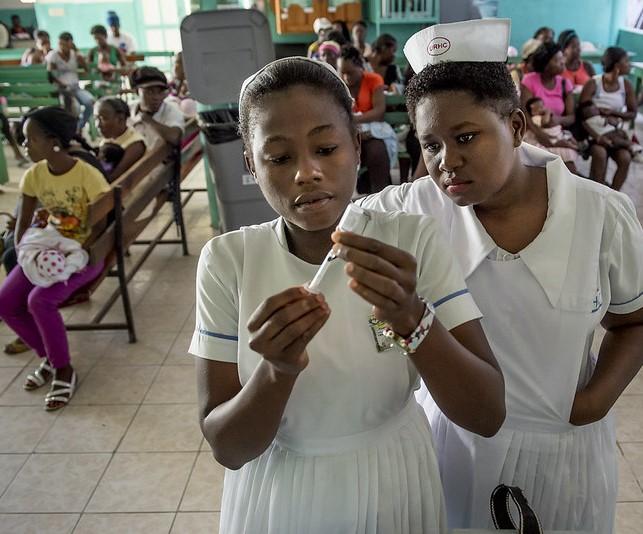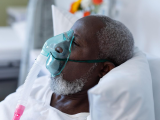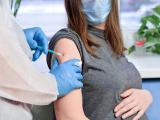With different parts of the world at different stages of the pandemic, with variations even within countries, World Health Organization (WHO) officials today urged nations to take extra care in relaxing their distancing measures, and they raised concerns about COVID-19 spreading in countries like Haiti that are already struggling with humanitarian issues.
The global total today reached 3,742,665 cases, and at least 261,517 people have died from their infections, according to the Johns Hopkins online dashboard.
WHO: Cautious, tailored approach for reopening
At a media briefing today, WHO Director-General Tedros Adhanom Ghebreyesus, PhD, said though cases are declining in Western Europe, more are reported each day in Eastern Europe, Africa, South East Asia, the Eastern Mediterranean, and the Americas. "However, even within regions and within countries we see divergent trends. Every country and every region needs a tailored approach," he said.
Tedros said the pandemic has severely disrupted essential health services, and many countries depend on trained community members to help doctors and nurses provide care. He said the WHO, UNICEF, and the International Federation of the Red Cross today published guidance on how to maintain community-based care during COVID-19 circulation.
Alongside the essential health service guidance, the guidance covers how to leverage community health workers for the COVID-19 response and how to keep them safe. It urges the use of telemedicine whenever possible and includes practical examples, such as delivering insecticide-treated bed nets for preventing malaria and other diseases, rather than having people pick them up at a central location.
Regarding easing lockdown measures, Tedros said the risk of ramping them back up is high if countries don't manage the transition very carefully. He repeated the six criteria the WHO recommends: strong surveillance, testing and contact tracing, minimizing risks in special settings such as nursing homes, putting prevention measures in places such as work and schools, managing imported cases, and educating communities.
Looking ahead to the postpandemic period, he said it will be crucial to invest in resilient health systems and preparedness, including systems to prepare for, prevent, and respond to emerging pathogens. "As we work on responding to this pandemic, we must also work harder to prepare for the next one," Tedros said.
Haiti faces 'perfect storm,' other areas vulnerable
At today's briefing, Mike Ryan, MD, who directs the WHO's health emergencies program, said the agency is concerned about some areas, not just based on case numbers, but also regarding underlying issues such as humanitarian crises in Afghanistan, Sudan, Palestine, Yemen, and Haiti. For example, the WHO said earlier this week that the virus is probably already circulating widely in war-torn Yemen.
And yesterday, Carissa Etienne, MBBS, MSc, director of the WHO's Pan American Health Organization (PAHO) said during a briefing that she is worried that difficulties in Haiti could trigger a broader humanitarian crisis, calling the situation a "perfect storm." Though the country has reported only 100 cases, 17,000 Haitians returned from the Dominican Republic, which is experiencing community transmission.
Haiti has few beds for treating COVID-19 patients, not enough healthcare workers, and little protective equipment. Many people don't have access to clean water and live in overcrowded households, where quarantine and isolation would be challenging. Growing food insecurity and civil unrest could further complicate the situation, she warned, adding that PAHO is urgently working with Haitian health authorities to prepare.
Germany agrees on lockdown steps
In Europe, German Chancellor Angela Merkel today announced steps to ease the lockdown, but they include an "emergency brake" to reinstate them if infections rise again, Reuters reported. Based on a meeting with governors, the newly announced measures include allowing people from two households to meet and opening more stores if protective measures are in place. Rules about maintaining 5-foot physical distancing and wearing face masks on public transport remain in place.
Germany's soccer league can resume play in the second half of May, and schools can start resuming, based on state plans. People in nursing homes can receive visits from a "permanent contact person." Emergency brake measures kick in if an area reports more than 50 new infections per 100,000 inhabitants over 7 days.
The UK Parliament is expected to receive a plan for easing the country's lockdown on May 10, CNN reported.
Russia will ease its restrictions in three phases, and, in a video conference today with government officials, President Vladimir Putin supported the plan, but said the country should not rush, Reuters reported. The first stage would allow people to return to the streets, the second would allow schools and some businesses to reopen, and the third would reopen recreational facilities and parks.
Global estimate: 90,000 health workers infected
In China, students in the country's previous outbreak epicenter of Wuhan returned to school today for the first time since January, CBS News reported. Students wore masks and went through thermal scanning.
Meanwhile, China reported 2 new cases today, both imported, along with 20 new asymptomatic cases, 3 of them imported, the National Health Commission said in its daily report.
In other developments:
- The International Council of Nurses said today that information from its national affiliates suggests that 90,000 healthcare workers have been infected with COVID-19 so far, including 260 nurses who died. It called on governments to keep accurate records of infections and deaths in medical workers.
- Hundreds of police in India have been infected with COVID-19 while enforcing the country's lockdown, including more than 450 in Maharashtra state, Reuters reported.
- Baltic states including Latvia, Lithuania, and Estonia, have created a regional "travel bubble" that will open borders to each other starting on May 15, a step toward easing some restrictions, Reuters





















